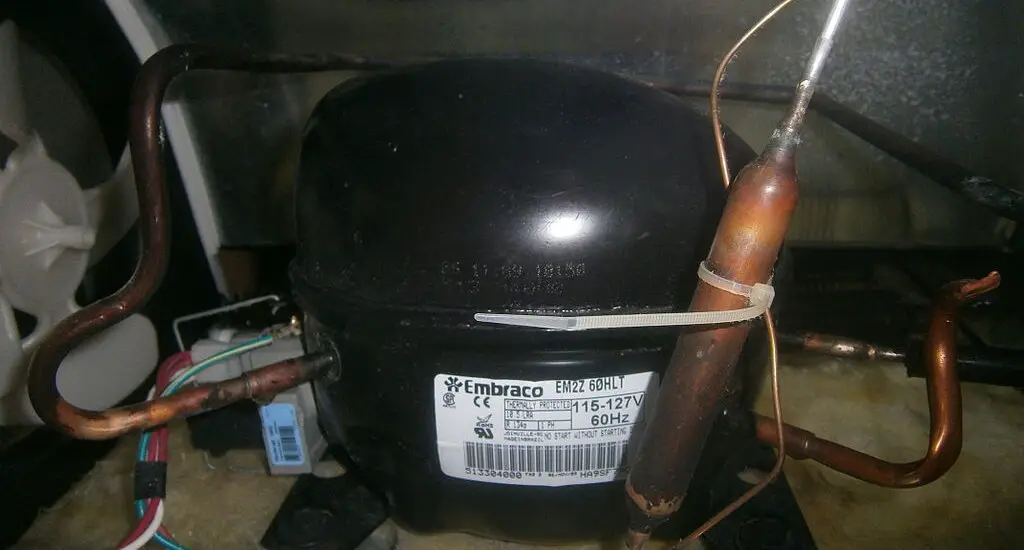This guide is a step-by-step walkthrough aimed at helping you diagnose and resolve refrigerator compressor issues effectively.

Table of Contents
Identifying Refrigerator Compressor Issues
The compressor is an essential component of your refrigerator. It circulates the refrigerant that keeps your fridge cold. When your compressor starts to fail, the symptoms may be subtle at first but can escalate. Understanding what to look for will help you take action before the problem becomes a crisis.
Unusual Noises: Normally, compressors emit a low, soft hum. If you start to hear louder, unfamiliar sounds like ticking, rattling, or buzzing, your compressor might be struggling. These unusual noises can stem from a loose or damaged part within the compressor unit.
Not Cooling: A refrigerator’s primary job is to keep things cold. If you notice your food spoiling faster than usual or the interior of the fridge feeling warm, the compressor might be failing. The failure to cool correctly can lead to food spoilage and waste.
Power Surges: A faulty compressor may consume more electricity, causing circuit breakers to trip frequently. If you notice your refrigerator tripping the electrical circuit, it’s a strong indicator of compressor issues.
Consult the Manual
Before you start worrying about costly repairs, grab your refrigerator’s user manual. This booklet often has a troubleshooting section that provides manufacturer-specific information.
If you’ve misplaced the manual, you can usually find a digital version on the manufacturer’s website. Input your refrigerator model number to locate the correct manual, then search for a section dedicated to refrigerator compressor issues or cooling problems.
Initial Checks to Confirm Refrigerator Compressor Issues
Before concluding that your compressor has a problem, there are some quick checks you can do to rule out other common issues.
Power Supply: An obvious but often overlooked step is to make sure the refrigerator is properly plugged into an electrical outlet. Also, check that the electrical outlet is functioning correctly by plugging in another device.
Thermostat Settings: Sometimes the temperature dial inside the fridge is accidentally adjusted. Make sure it’s set to an appropriate temperature for cooling. Usually, a mid-range setting is a good starting point.
Ventilation: Lack of sufficient airflow around the refrigerator can also impact the compressor’s efficiency. Ensure there is at least a few inches of space on all sides of the appliance for better ventilation.
Professional Diagnosis of Refrigerator Compressor Issues
If you’ve tried basic troubleshooting and still experience issues, it’s time to seek professional help. Qualified technicians have the equipment and knowledge to diagnose your compressor precisely.
They can use multimeters to measure voltage and resistance, thereby confirming whether the compressor is the issue. This diagnosis can help you decide whether repairing or replacing the compressor is the most cost-effective option.
Check out this KAIWEETS Digital Multimeter listed on Amazon.
Common Fixes for Refrigerator Compressor Issues
After diagnosis, depending on the severity and nature of the problem, there are several courses of action.
Capacitor Replacement: A compressor needs a capacitor to start up. If this component fails, the compressor won’t work at all. Replacing a faulty capacitor is one of the least expensive fixes.
Compressor Relay Switch: This switch helps the compressor start and keep running. If the switch fails, the compressor won’t work correctly. Replacement is generally straightforward but should be done by professionals.
Compressor Replacement: If the compressor itself is the problem and cannot be repaired, a full replacement may be necessary. Be warned, this is an expensive option and should be your last resort.
Check out these other articles…
Refrigerator Compressor Frozen: 4 Easy Steps to Fix It
Refrigerator Compressor Getting Louder: Easy Solution Guide
Refrigerator Compressor Gas Pressure: Easy 411 Guide
Refrigerator Compressor Going Out: Signs, Solutions, & More
How Do I Find Out the HP of My Refrigerator Compressor?
Preventive Measures Against Refrigerator Compressor Issues
Preventing issues is always better than resolving them. To minimize the risk of future refrigerator compressor issues:
Regular Cleaning: Dust and debris can accumulate on the coils, making the compressor work harder. Clean the coils every 6–12 months.
Ventilation: Ensure there is sufficient space around your refrigerator for air to circulate freely.
Periodic Inspection: Have a technician inspect your refrigerator every couple of years to catch potential issues before they become serious problems.